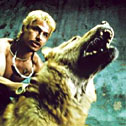
Movie Guru Rating:

Comment
on this review
| |

Mexico's Amores Perros reveals a savage underworld
by Coury Turczyn
Inevitably, any film that dares to feature criminals in separate, interlinked stories that sometimes overlap will be compared to Pulp Fiction. And in most cases, amid the last seven years' spray of bullets and ironic dialogue, the accusations of "cheap imitation" have been justified. But not this time.
Mexican director Alejandro González Iñárritu's Amores Perros makes Pulp Fiction look like a comic-book drama cooked up by a video store clerk who's seen too many B-movies.
Brutal, unflinching, and oftentimes frighteningly realistic, Amores Perros drops you into a criminal underworld you will not enjoy visiting. Rather than sitting around discussing the Gallic appropriations of American Big Macs, Iñárritu's criminals are Mexico City gutter punks who make money by throwing their dogs into pit fights until they're inevitably mauled to death. Trapped in a chaotic, crowded, and bloody urban hell, they will do whatever they must to serve themselves—even if that means killing their own brothers. And that's just in the first third of Amores Perros.
Scripted by Guillermo Arriaga, the film's other two stories aren't nearly as harrowing as that first dip into the acid bath, but they are similarly corrosive. Amores Perros not only tells three tales of human failing, but does so in three different styles particular to Latin cinema. The first part, "Octavio and Susana," is shot as cinema verité, a gritty expose of the dogfighting abyss. The second, "Daniel and Valeria," is more cosmopolitan, with a literary nod toward Edgar Allen Poe. The third, "El Chivo and Maru," aims for a touch of the surreal with a Biblical parable. The chapters bleed into each other (not just figuratively), combining to create a portrait of Mexico City as a smog-shrouded city of opposites, whose denizens are linked by their doomed choices and their allegiances to their dogs—which are stronger than the bonds to their fellow humans.
Amores Perros (loosely translated: "Love's a Bitch") hits the screen with a frenzied car chase that serves as the linking point between the three tales. Two punks careen their crappy American sedan through busy streets, racing for their lives as a pick-up truck of gangsters chases them, guns cocked. In the back seat, a dog lies in a pool of its own blood, shot through the side. Streets flash by, faces, traffic lights, screams, then a massive collision as the sedan explodes into another car. Through the film's next three chapters—which stretch over two and a half hours—we see the events that led to the collision and the consequences afterward.
In "Octavio and Susana," we meet Octavio (Gael GarcÍa Bernal), a screwed-up youth who's in love with his brother's wife, Susana (Vanessa Bauche). Convinced that he can rescue her from his abusive brother if he only had enough money, he pits his beloved dog Cofi into dogfights. The fight sequences are stomach-churning; no matter how "desensitized" we moviegoers have become to seeing humans sliced, diced, and eaten on screen, it will forever remain difficult to watch animals being hurt or killed. (Despite the reassurance in the opening credits that no dogs were harmed in making Amores Perros, it's difficult to keep it in mind when you see the lifelike carnage.) But that's part of the point. Iñárritu effectively shows how low we humans can go when life means so little to us; we sometimes care more about animals than each other... and perhaps rightfully so.
The other two chapters reinforce this theme with more subtlety. In "Daniel and Valeria," a well-off magazine editor (�lvaro Guerrero) abandons his family to live with a hot, young model (Goya Toledo) who becomes a victim of the opening scene's car crash. But it's the loss of her dog underneath the floor of their apartment that sends their dream into a nightmare. In "El Chivo and Maru," a revolutionary-turned-squatter (Emilio EchevarrÍa) rescues Cofi from the car accident even as he hires himself out as a cheap hitman.
Although each story is told—and even shot—in a different style, they fuse together well on the power of their themes and the grace of the actors. The cast brings great realism to their roles (in particular Bernal's confused Octavio), portraying dismayingly typical human characters. These are not smart protagonists who you root for; these are deeply flawed people who make bad decisions and suffer the almost Biblical consequences.
Sure, Quentin Tarantino might snatch some credit for Amores Perros' story structure, but that's where the similarities end. One is light entertainment; the other is a kick to the stomach. Amores Perros remains an extremely daring movie for a first-time director, and Iñárritu mostly pulls it off (the 154 minutes can get gruelingly long). With a bevy of international film awards under his arm—including an Oscar nomination for Best Foreign Language Film—Iñárritu may be on his way to becoming the global filmmaker Mexico needs to bring the world's attention to its cinema.

May 3, 2001 * Vol. 11, No. 18
© 2000 Metro Pulse
|